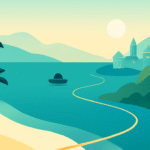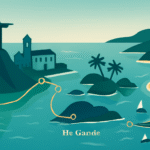Imagine swapping your office cubicle for a vibrant workspace just minutes from world-class surf breaks, lush hiking trails, and a sparkling lagoon. This isn’t a far-fetched dream; it’s the daily reality for a growing number of remote workers who have discovered Florianópolis, Brazil. Affectionately known as “Floripa” or the “Magic Island,” this southern Brazilian gem has rapidly emerged as a top destination for digital nomads seeking an unbeatable combination of stunning natural beauty, a high quality of life, a burgeoning tech scene, and a relatively affordable cost of living.
Nestled off the coast of Santa Catarina state, Florianópolis offers a unique blend: the amenities of a modern city seamlessly integrated with over 40 distinct beaches, rolling green hills, and the expansive Lagoa da Conceição lagoon. It’s a place where productivity meets paradise, attracting a diverse community of entrepreneurs, freelancers, tech professionals, and creatives from around the globe. But beyond the postcard-perfect scenery, what makes Floripa truly tick for the location-independent professional? Is the infrastructure reliable? Can you find a supportive community? And crucially, what does it actually cost to live and work here?
This comprehensive guide dives deep into everything you need to know about making Florianópolis your next digital nomad base. We’ll explore the island’s unique lifestyle, navigate the practicalities of visas and finding the right neighborhood, uncover the best co-working spaces and cafes for productivity, and break down the real cost of living. Whether you’re contemplating a short workation or a longer-term relocation, read on to discover if the Magic Island holds the key to your ideal remote work experience.
The Floripa Lifestyle: Quality of Life, Nature, and Community

What draws digital nomads across continents to this specific Brazilian island? It’s a potent mix of unparalleled natural beauty, a high standard of living compared to other parts of Brazil, and a welcoming, dynamic community.
A Natural Paradise Beckons
Florianópolis is, first and foremost, an island blessed with extraordinary natural diversity. Its claim to fame includes 42 official beaches, each with its own distinct character.
Surfers flock to the powerful waves of Praia Mole and Joaquina on the east coast, while families prefer the calm, warm waters of Jurerê or Daniela in the north. Campeche beach offers a long stretch of white sand perfect for walks and kitesurfing, while the southern beaches like Matadeiro feel wild and untouched. Beyond the coastline, the island is crisscrossed with hiking trails (trilhas) leading through Atlantic rainforest to hidden coves and breathtaking viewpoints. The centerpiece, Lagoa da Conceição, is a vast saltwater lagoon perfect for kayaking, stand-up paddleboarding, windsurfing, and enjoying stunning sunsets from waterfront bars and restaurants.
Quality of Life and Wellness Focus
Compared to Brazil’s sprawling metropolises like São Paulo or Rio de Janeiro, Florianópolis consistently ranks high for quality of life. It’s widely perceived as one of the safest state capitals in Brazil, a significant draw for international visitors. While petty crime exists, as in any city, the overall atmosphere feels more relaxed and secure. There’s a strong emphasis on outdoor living and wellness, reflected in the abundance of gyms, yoga studios, organic markets, and health-conscious cafes. The pace of life, particularly outside the downtown Centro area, feels slower and more connected to nature’s rhythms.
Climate Considerations
Floripa enjoys a humid subtropical climate. Summers (December to March) are hot and humid, with average temperatures ranging from 70°F to 85°F (21°C to 29°C), perfect for beach life but also bringing more rain showers and peak tourist crowds. Winters (June to August) are mild and can be rainy, with temperatures typically between 55°F and 70°F (13°C to 21°C). Many nomads prefer the shoulder seasons – spring (September to November) and autumn (March to May) – which offer pleasant temperatures, less rain, and fewer crowds, creating ideal conditions for both work and exploration.
The Vibe: Beach Town Meets Tech Hub
Florianópolis possesses a unique dual identity. On one hand, it retains a laid-back beach town atmosphere, especially in neighborhoods like Lagoa da Conceição and Campeche. On the other, it boasts a rapidly growing tech and startup ecosystem, earning it the nickname “Silicon Island.” This blend attracts a diverse crowd, from surfers and artists to software developers and entrepreneurs, fostering a dynamic and creative environment.
A Welcoming Community
The digital nomad and expat community in Florianópolis is vibrant and growing. Numerous Facebook groups, WhatsApp chats, and Meetup events make it relatively easy to connect with like-minded individuals. Organizations like Startup Grind Florianópolis host regular events, and coworking spaces often serve as community hubs. While locals (known as “Manezinhos da Ilha”) might seem reserved initially compared to other Brazilians, many nomads report finding a welcoming and supportive network once they settle in.
Getting Started: Visas and Legal Requirements for Digital Nomads in Brazil

Brazil has actively courted remote workers by introducing a specific Digital Nomad Visa (VITEM XIV), simplifying the process for longer stays. Understanding your options is crucial for a hassle-free transition.
The Brazilian Digital Nomad Visa (VITEM XIV)
Launched in early 2022, this visa is designed for foreign nationals employed by or providing services to companies outside Brazil while working remotely from Brazilian territory. Key aspects include:
- Duration: Initially granted for one year, with the possibility of renewal for another year.
- Eligibility: You must prove a stable remote work relationship with a foreign employer or clients.
- Income Requirement: Applicants need to demonstrate a minimum monthly income of US$ 1,500 OR have at least US$ 18,000 in bank savings at the time of application.
- Required Documents (General List – check specific consulate requirements):
- Valid Passport (with at least 6 months validity remaining)
- Completed Visa Application Form
- Passport-sized Photo
- Proof of Remote Work (employment contract, service agreement, etc.)
- Proof of Income (bank statements, pay slips)
- Clean Criminal Record Certificate (from your home country and potentially others where you’ve lived recently)
- Proof of Health Insurance valid in Brazil
- Proof of Visa Fee Payment (around US$ 100-120, varies by consulate)
- Application Process: You can typically apply at a Brazilian Consulate or Embassy in your home country *before* traveling. Alternatively, it’s possible to enter Brazil as a tourist and then apply for residency under the digital nomad category through the Federal Police via the online MigranteWeb system. Applying from within Brazil might be more complex and require assistance.
Tourist Visa as an Alternative
For shorter stays, many digital nomads utilize Brazil’s standard tourist visa rules. Citizens from many countries (including the EU, UK, USA, Canada, Australia) can enter Brazil visa-free for tourism purposes for up to 90 days. This stay can often be extended for another 90 days by applying at the Federal Police (Polícia Federal) within Brazil, allowing for a total stay of up to 180 days in a 12-month period. While technically you shouldn’t *work* on a tourist visa, the definition is often interpreted loosely for remote work for foreign companies where no income is generated within Brazil. However, the Digital Nomad Visa provides a more secure legal standing for longer-term remote work.
Important Note: Visa regulations can change. Always consult the official website of the Brazilian Ministry of Foreign Affairs (Itamaraty) or the nearest Brazilian Consulate for the most up-to-date information before making plans.
Finding Your Base: Best Neighborhoods for Digital Nomads in Florianópolis
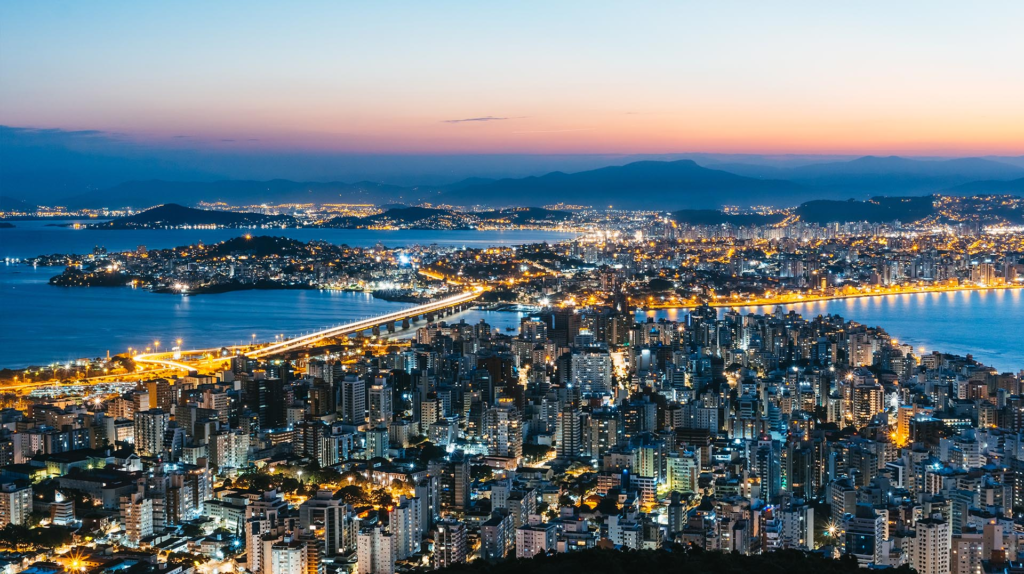
Choosing the right neighborhood (bairro) is key to your Floripa experience. The island is larger than it looks, and each area offers a distinct vibe, cost, and level of convenience. Here are the top contenders for digital nomads:
Lagoa da Conceição: The Nomad Epicenter
Often considered the heart and soul of Florianópolis’s digital nomad scene. This vibrant area surrounds the picturesque lagoon.
- Pros: Bustling atmosphere, tons of cafes, restaurants, bars, and shops. Hub for coworking spaces (Impact Hub, Selina). Easy access to popular eastern beaches like Praia Mole and Joaquina. Strong nomad and expat community. Good public transport connections (relative to other areas).
- Cons: Can be crowded and noisy, especially during high season. Accommodation can be pricier and harder to find. Traffic around the Centrinho (little center) can be intense.
- Best for: Nomads seeking social connection, convenience, nightlife, and proximity to both lagoon activities and surf beaches.
Campeche: Beach Life & Growing Hub
Located south of Lagoa on the east coast, Campeche offers a long, beautiful beach and a more laid-back vibe, while still having good infrastructure.
- Pros: Stunning beach perfect for walking, kitesurfing, and relaxing. Growing number of cafes, restaurants, and amenities. Home to coworking spaces like O Sítio. Generally perceived as safe and family-friendly. Offers a good balance between nature and convenience.
- Cons: More spread out than Lagoa, potentially requiring a car or scooter for easy mobility. Fewer nightlife options compared to Lagoa. Can feel a bit suburban in parts.
- Best for: Beach lovers, kitesurfers, those seeking a slightly quieter base than Lagoa but still wanting community and amenities.
Centro (Downtown): Urban Convenience
The island’s main commercial and administrative hub, located on the western side closest to the mainland.
- Pros: Best urban infrastructure, widest range of shops, services, banks, and transport links (main bus terminal). More coworking options, including Impact Hub. Generally more affordable long-term rentals compared to prime beach areas. Proximity to the mainland bridge.
- Cons: Lacks the beach town atmosphere. Can feel less safe at night in certain areas. Further from the popular eastern and northern beaches (requires bus or car). Less of a distinct nomad vibe compared to Lagoa or Campeche.
- Best for: Nomads prioritizing urban convenience, budget-friendly long-term rentals, and easy access to services and transport.
Jurerê Internacional: Upscale & Polished
Located on the north shore, Jurerê is known for its calm waters, luxury homes, sophisticated beach clubs, and higher price tag.
- Pros: High standard of living, very safe, beautiful and calm beach. Excellent restaurants and beach clubs. Polished infrastructure.
- Cons: Significantly more expensive for accommodation and dining. Can feel somewhat artificial or lacking authentic Brazilian culture for some. Fewer dedicated coworking spaces (more cafe-working). Less of a grassroots nomad community.
- Best for: Nomads seeking luxury, comfort, safety, and a high-end beach scene, and who have a larger budget.
Barra da Lagoa: Charming & Budget-Friendly
A traditional fishing village nestled between the lagoon and the ocean, east of Lagoa da Conceição.
- Pros: Charming, rustic atmosphere. More affordable accommodation options (hostels like Nômades Hostel & Coworking). Direct access to Barra da Lagoa beach and nearby natural pools. Close to hiking trails (e.g., to Praia da Galheta).
- Cons: More basic infrastructure compared to Lagoa or Centro. Can feel isolated for some. Fewer upscale amenities.
- Best for: Budget-conscious nomads, backpacker types, those seeking a more authentic village feel close to nature.
Other Areas to Consider: Rio Tavares (south of Campeche, popular with surfers), Santo Antônio de Lisboa (charming historic district with sunset views, quieter), Canasvieiras (popular with Argentinian tourists, busy in summer).
Choosing Tip: Consider your priorities. Do you want to be in the heart of the action (Lagoa)? Prioritize beach access (Campeche, Barra)? Need urban convenience (Centro)? Or prefer luxury (Jurerê)? Visiting for a week or two and exploring different neighborhoods before committing to a long-term rental is often a good strategy.
Workspaces for Productivity: Coworking Spaces and Cafes
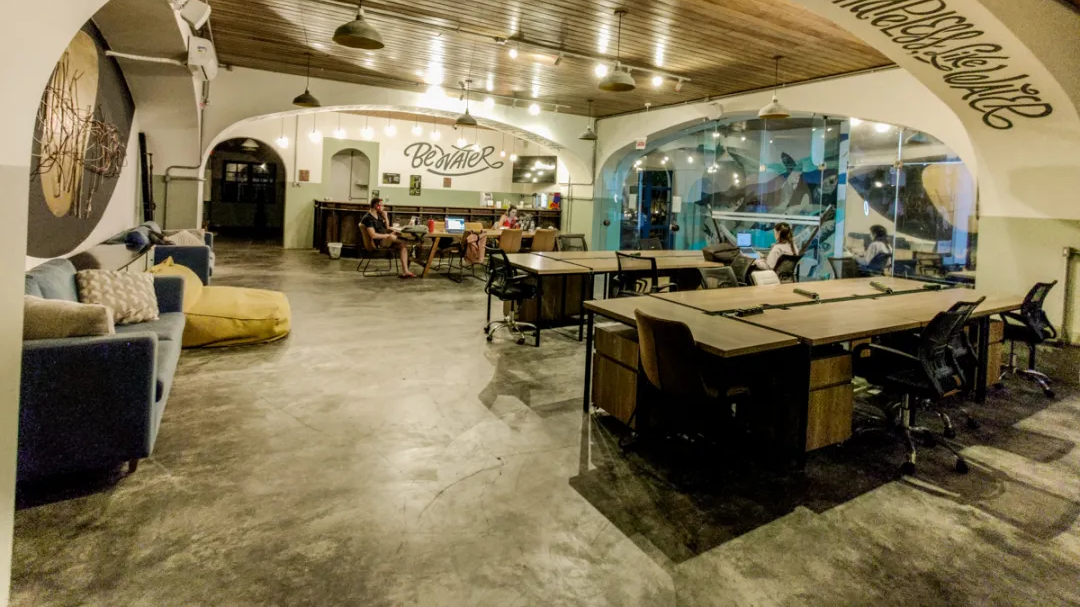
Florianópolis offers a solid and growing selection of workspaces catering to digital nomads, from dedicated coworking hubs to laptop-friendly cafes.
The Coworking Scene
Finding a dedicated space with reliable internet, comfortable seating, and a professional atmosphere is crucial for many remote workers. Floripa delivers with several excellent options:
- Impact Hub Floripa (Centro & Lagoa da Conceição): Part of a global network, Impact Hub offers modern, well-equipped spaces with a focus on social impact and entrepreneurship. They host frequent networking events, workshops, and community gatherings. Ideal for those seeking professional connections and a structured environment. Expect monthly plans around R$ 600-800 (approx. US$ 110-150).
- Selina (Lagoa da Conceição & Praia Mole): More than just a coworking space, Selina integrates coliving, wellness activities, and social events. Their coworking areas are stylish and attract a young, international crowd. It’s a great option if you’re looking to easily meet other nomads and travelers. Prices might be slightly higher, often bundled with accommodation or activity packages, but daily/weekly passes are usually available.
- O Sítio Coworking (Campeche, Barra da Lagoa, etc.): With multiple locations often near the beach, O Sítio emphasizes community, creativity, and connection with nature. Their spaces often have a unique design and host local events. A good choice for those wanting a more locally integrated, community-focused vibe. Pricing is generally competitive, similar to Impact Hub.
- Sandbox Coworking (Lagoa da Conceição & other locations): Known for providing reliable infrastructure and a straightforward, professional working environment. A solid choice if your priority is simply a quiet, functional space to get work done.
- Nômades Hostel & Coworking (Barra da Lagoa): A budget-friendly option combining affordable hostel accommodation with a dedicated coworking area. Perfect for backpackers or nomads on a tighter budget who still need a designated workspace.
Categorizing Your Choice
- For Global Networking & Professional Vibe: Impact Hub
- For Socializing & Integrated Living: Selina
- For Local Community & Creative Spaces: O Sítio
- For Budget & Hostel Atmosphere: Nômades Hostel
- For Reliable Infrastructure: Sandbox, Impact Hub
Laptop-Friendly Cafes
For those who prefer a more casual work environment (or need a change of scenery), Floripa has numerous cafes where setting up shop with a laptop is common:
- Café Cultura (Multiple Locations, especially Lagoa & Primavera Garden): A popular chain known for good coffee, decent food, and a generally welcoming atmosphere for workers. Wi-Fi is usually reliable, though it can get busy.
- Other Cafes in Lagoa da Conceição: The Centrinho area is packed with smaller cafes, many offering Wi-Fi. Explore and find your favorite spot.
- Cafes in Centro & Campeche: These areas also offer various options, from local padarias (bakeries) with basic Wi-Fi to more specialized coffee shops.
Cafe Working Etiquette: Be mindful of peak hours, purchase drinks/food regularly, don’t hog tables for hours with just one coffee, and have a backup internet plan (like a local SIM card hotspot) as cafe Wi-Fi can be less reliable than dedicated coworking spaces.
Internet Speed Considerations
While fiber optic internet (fibra ótica) is increasingly available across the island, especially in central areas and popular neighborhoods like Lagoa and Campeche, speeds and reliability can still vary. Providers like Vivo Fibra, Claro NET, and various local companies offer plans ranging from 50 Mbps to 500 Mbps or more. However, outages can occur, particularly during storms. Most coworking spaces invest in robust, redundant connections, making them a safer bet for critical work calls or uploads. When renting accommodation, always confirm the internet speed and provider with the landlord or host.
The Bottom Line: Understanding the Cost of Living in Florianópolis
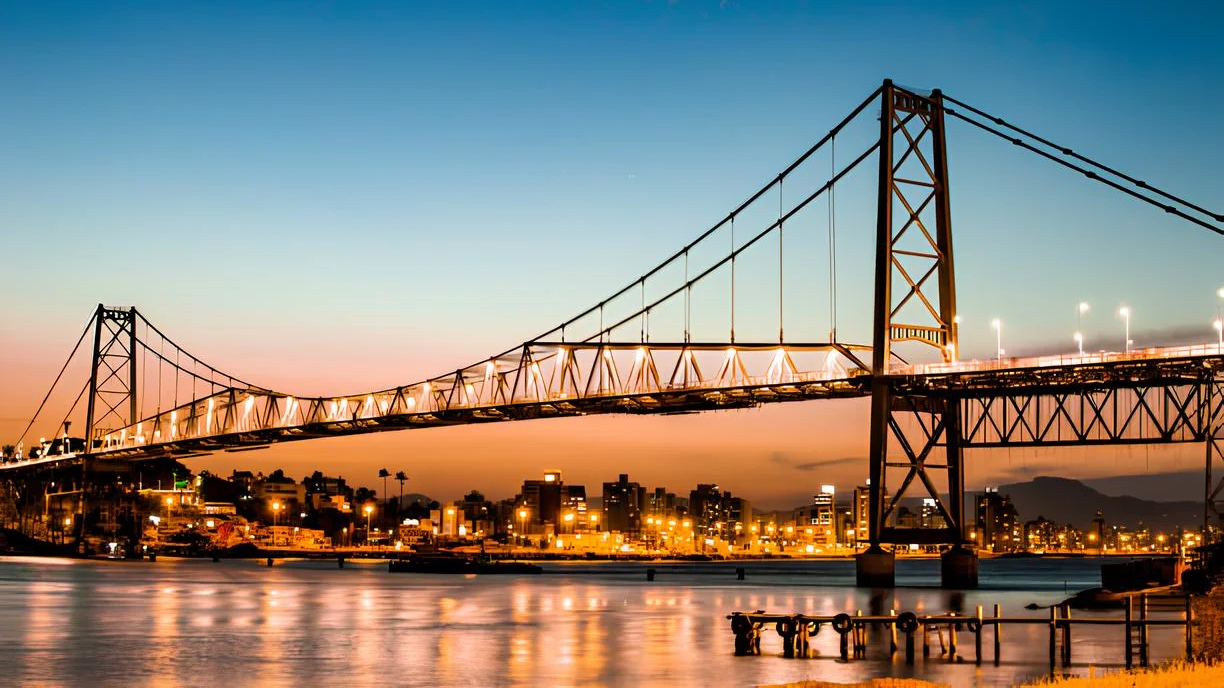
One of Floripa’s major draws is its affordability compared to major digital nomad hubs in North America or Europe. However, it’s not the cheapest destination in Latin America, and costs can fluctuate, especially during the high season (December-February). Here’s a realistic breakdown for a single digital nomad:
Overall Affordability
Numbeo estimates Florianópolis is roughly 69% less expensive than New York City (excluding rent). Compared to other Brazilian cities, it’s generally more affordable than São Paulo or Rio de Janeiro but potentially pricier than cities in the Northeast. Many nomads find they can live comfortably for US$ 1,000 to US$ 1,600 per month, depending heavily on accommodation choices and lifestyle.
Detailed Monthly Cost Breakdown (Estimates)
(Note: Values are approximate averages based on 2024/2025 data. BRL values converted at roughly 1 USD = 5.5 BRL, subject to change.)
- Accommodation (Rent):
- Private room in shared flat: R$ 1,200 – R$ 2,000 (US$ 220 – $365)
- Studio/1-bedroom apt (outside prime areas): R$ 1,800 – R$ 2,800 (US$ 330 – $510)
- Studio/1-bedroom apt (Lagoa, Campeche, Centro – good location): R$ 2,500 – R$ 4,500 (US$ 455 – $820)
- Airbnb (monthly studio/1-bed): Often starts around US$ 600-900+, higher in peak season.
- Food:
- Groceries: R$ 900 – R$ 1,300 (US$ 165 – $235)
- Eating Out (mix of budget/mid-range): R$ 1,000 – R$ 1,800 (US$ 180 – $330)
- Total Food Estimate: R$ 1,900 – R$ 3,100 (US$ 345 – $565)
- Transportation (No Car):
- Public Transport Pass/Usage: ~R$ 200 (US$ 36)
- Ride-Sharing (Uber/99 – moderate use): R$ 300 – R$ 600 (US$ 55 – $110)
- Total Transport Estimate: R$ 500 – R$ 800 (US$ 90 – $145)
- Utilities (Electricity, Water, Gas, Condo Fees if applicable): R$ 300 – R$ 600 (US$ 55 – $110) – Can be higher with heavy AC use.
- Internet (Home): R$ 100 – R$ 150 (US$ 18 – $27)
- Mobile Phone Plan (with data): R$ 50 – R$ 100 (US$ 9 – $18)
- Coworking Space Membership: R$ 400 – R$ 800 (US$ 75 – $145)
- Leisure & Entertainment (Gym, occasional drinks/activities): R$ 500 – R$ 1,000 (US$ 90 – $180)
Sample Monthly Budgets (Single Person)
- Budget Nomad (Shared Flat, mostly cooking, limited eating out, bus/walking): R$ 4,500 – R$ 6,000 (approx. US$ 820 – $1,100)
- Mid-Range Nomad (Own Studio/1-bed Apt, mix cooking/eating out, coworking, moderate Uber): R$ 6,500 – R$ 9,000 (approx. US$ 1,180 – $1,640)
- Comfortable Nomad (Nicer Apt, frequent eating out, leisure activities, coworking): R$ 9,000+ (approx. US$ 1,640+)
Tips for Saving Money
- Travel during the shoulder seasons (spring/autumn) for lower accommodation prices.
- Cook more meals at home; shop at local markets (feiras) for fresh produce.
- Utilize the public bus system where feasible.
- Look for long-term rental contracts (6+ months) instead of short-term stays or Airbnb for better rates.
- Take advantage of free activities like hiking and beach days.
- Opt for shared accommodation initially to reduce costs and meet people.
Navigating the Island: Infrastructure, Transport, and Safety
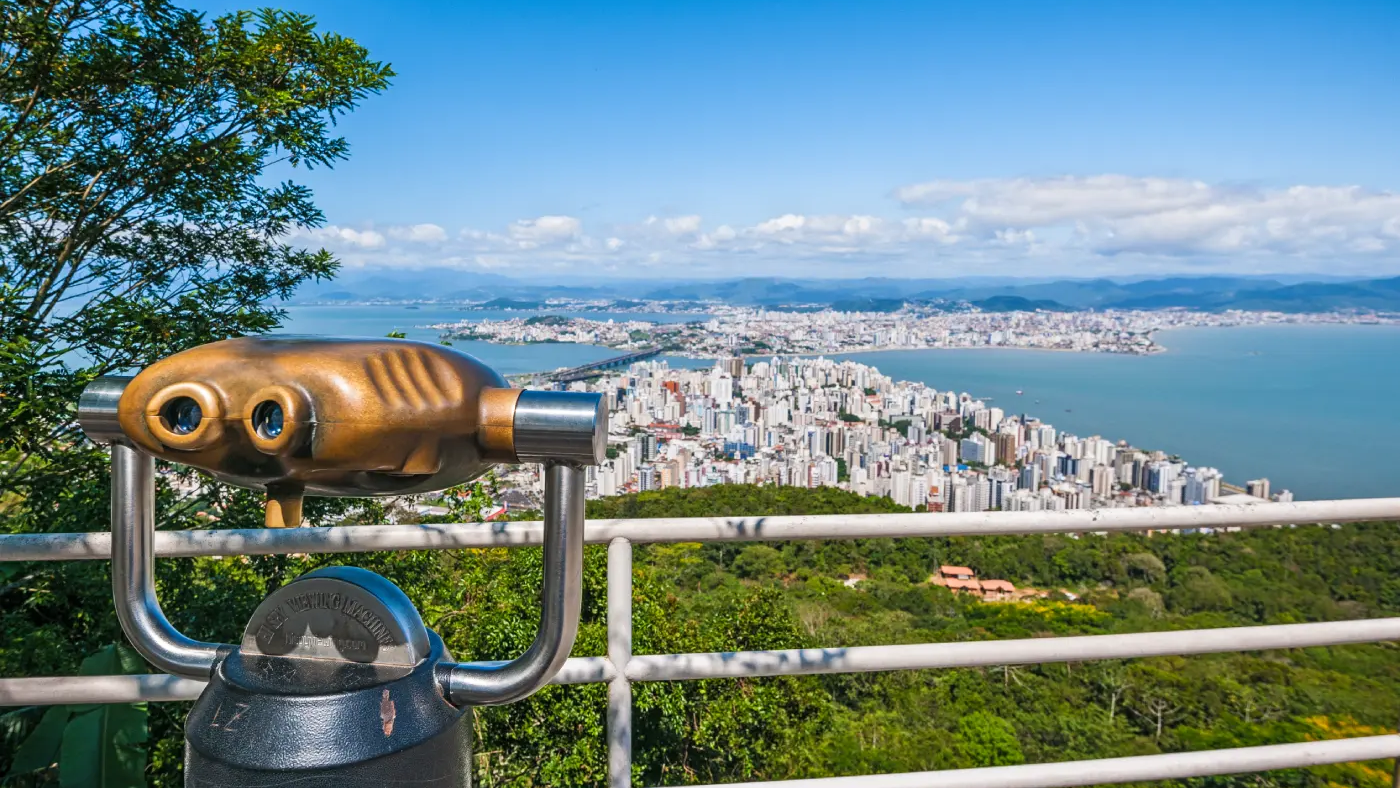
Understanding the practicalities of daily life is essential for a smooth digital nomad experience in Florianópolis.
Internet Reliability
As mentioned, while improving, internet connectivity can be a concern. Fiber optic is widespread in populated areas, but quality varies by provider and specific location. Power outages, especially during summer storms, can occasionally disrupt service. Having a mobile hotspot (using a local SIM card from providers like Vivo, Claro, or TIM) is a wise backup strategy. Coworking spaces generally offer the most reliable connections.
Getting Around the Island
Florianópolis is an island, and navigating it requires some planning:
- Public Buses: An extensive bus network covers most of the island, operated primarily by Consórcio Fênix. It’s the most affordable option (fares around R$ 4-6 or US$ 0.75-1.10), but routes can be slow and indirect, especially between distant beaches. Using apps like Moovit or Google Maps is essential for planning bus journeys.
- Ride-Sharing (Uber/99): Widely available and relatively affordable compared to North American/European prices. Essential for evenings or reaching areas poorly served by buses. Wait times can increase during peak season or in more remote areas.
- Car/Scooter Rental/Ownership: Many long-term nomads opt to rent or buy a car or scooter for maximum flexibility, especially if living outside the main hubs or wanting to explore frequently. Be prepared for heavy traffic during peak season and rush hours, and note that parking can be challenging in popular spots. Distances between the north and south ends of the island can take over an hour to drive. (Approx. 34 miles / 54 km from north to south tip).
- Cycling: Possible in flatter areas like Centro or along coastal paths (Beira Mar Norte), but the island’s hilly terrain makes it challenging for commuting between many neighborhoods.
Safety Considerations
Florianópolis is generally considered safe by Brazilian standards, particularly in tourist areas and popular nomad neighborhoods during the day. However, it’s not immune to crime.
- Petty Theft: Pickpocketing and phone snatching can occur, especially in crowded areas (Centro, bus terminals, beaches during high season). Be aware of your surroundings, avoid flashing valuables, and keep belongings secure.
- Night Safety: Exercise caution when walking alone at night, particularly in quieter streets or less populated areas. Stick to well-lit main roads or use ride-sharing apps. Centro can feel deserted and less safe after business hours.
- Car Break-ins: If renting a car, don’t leave valuables visible inside.
- General Advice: Learn basic Portuguese phrases, avoid walking on empty beaches late at night, and trust your intuition. The overall risk for violent crime targeting tourists is relatively low compared to other major Brazilian cities.
Healthcare
Brazil has a public healthcare system (SUS), which is free but often overburdened and with long waiting times. Most expats and digital nomads opt for private healthcare. Excellent private hospitals and clinics are available in Florianópolis, but costs can be high without insurance. Comprehensive travel or international health insurance covering Brazil is highly recommended for all digital nomads.
Floripa for Nomads: Weighing the Pros and Cons
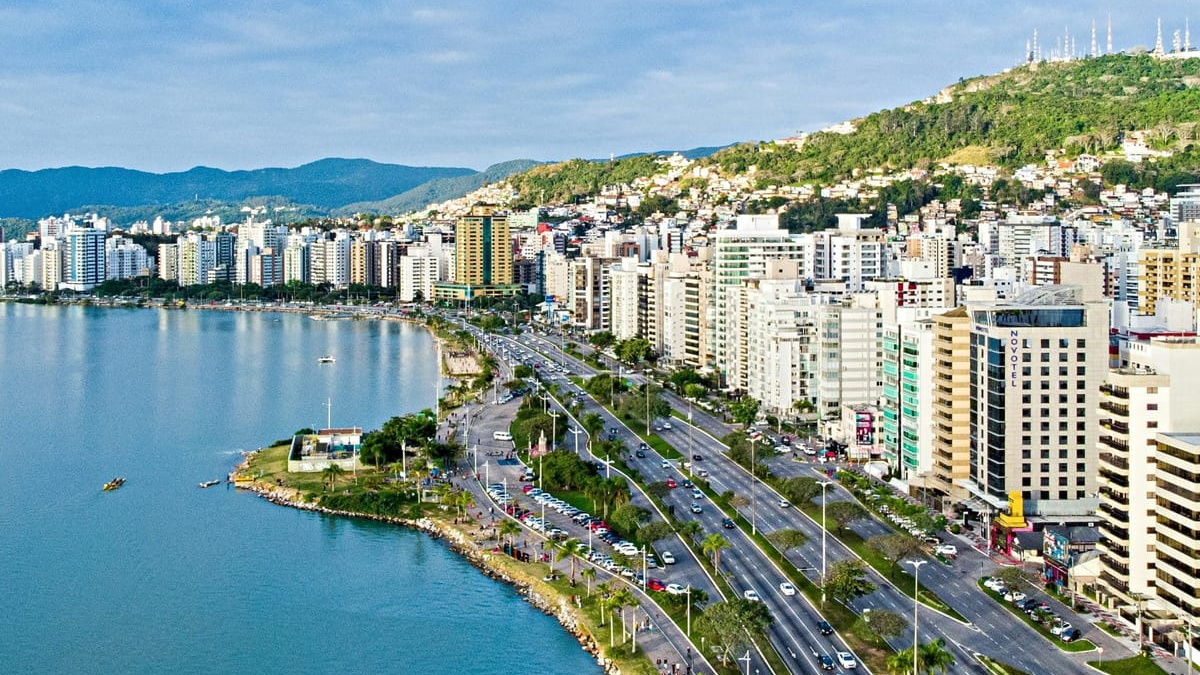
Is Florianópolis the right fit for you? Let’s summarize the key advantages and potential drawbacks:
Pros:
- Unbeatable Nature & Lifestyle: Stunning beaches, lush greenery, outdoor activities galore, promoting a healthy work-life balance.
- High Quality of Life: Relatively safe, clean (in many areas), and less chaotic than larger Brazilian cities.
- Vibrant Community: Active and welcoming digital nomad, expat, and tech communities make it easy to connect.
- Growing Infrastructure: Improving internet, good selection of coworking spaces, increasing amenities.
- Affordability (Relative): Significantly cheaper than major hubs in the US, Europe, or Australia/NZ.
- Tech Scene: Opportunities for networking and potential collaboration within the local startup ecosystem.
Cons:
- Internet Inconsistency: While improving, it may not meet the standards of those used to ultra-high-speed, perfectly stable connections elsewhere.
- Transportation Challenges: Public transport can be slow; navigating the island often requires ride-sharing or a personal vehicle, adding cost and complexity.
- Seasonality: High season (summer) brings crowds, traffic jams, and inflated prices. Winter can be cool, grey, and rainy.
- Cost Creep: While affordable globally, it’s one of Brazil’s more expensive cities, and costs (especially rent) are rising due to its popularity.
- Distances: The island is large, and commuting between different areas can be time-consuming.
- Language Barrier: While English is spoken in tourist/nomad circles, Portuguese is essential for deeper integration and daily errands outside these bubbles.
Practical Tips for a Smooth Transition
Ready to take the plunge? Here are some tips for making your move to Floripa easier:
- Best Time to Arrive: Consider arriving in the shoulder seasons (March-May or September-November) for pleasant weather, fewer crowds, and potentially better deals on initial accommodation.
- Finding Accommodation: Use Airbnb or Booking.com for initial short-term stays while you explore neighborhoods. For long-term rentals (6+ months), local platforms like QuintoAndar, Zap Imóveis, or local real estate agents (imobiliárias) are common, but often require a Brazilian co-signer (fiador) or significant deposit (caução). Facebook groups for expats/nomads in Floripa can also be useful for finding rooms or direct rentals.
- Connect Early: Join Florianópolis digital nomad/expat Facebook and WhatsApp groups before you arrive to ask questions and start networking. Attend meetups and events once you land.
- Learn Basic Portuguese: While you can get by with English in some circles, knowing basic greetings, numbers, and phrases for ordering food or asking directions makes daily life much smoother and shows respect for the local culture. Duolingo, Babbel, or local language schools are good resources.
- Banking & Payments: Brazil heavily uses Pix (instant bank transfers via QR code/phone number) and debit/credit cards (often with contactless payment). While international cards work, having a local digital bank account (like Nubank or Inter, though opening as a foreigner can be tricky without residency) simplifies Pix payments. Wise (formerly TransferWise) is excellent for managing international transfers.
- Stay Safe: Follow standard safety precautions: be aware of your surroundings, secure your belongings, avoid risky areas at night, and don’t flaunt wealth.
Conclusion: Is Florianópolis Your Next Digital Nomad Destination?
Florianópolis offers a compelling package for digital nomads: world-class natural beauty, a desirable lifestyle focused on wellness and the outdoors, a growing tech scene, a welcoming community, and a cost of living that remains attractive compared to many global alternatives. The Magic Island offers a unique proposition. However, it’s not without its challenges. Potential hurdles like internet variability, transportation logistics, and seasonal fluctuations require consideration and adaptation.
Who is Floripa best suited for? It’s ideal for nomads who prioritize nature and outdoor activities alongside their work, appreciate a strong sense of community, value safety, and are comfortable navigating a city where English isn’t universally spoken outside specific circles. It might be less ideal for those requiring absolute top-tier internet stability at all times or those who prefer the seamless convenience of highly developed urban public transport. Ultimately, Florianópolis rewards those willing to embrace its unique rhythm.
If the idea of productive workdays punctuated by beach walks, lagoon paddles, and connections with a diverse international community appeals to you, then the Magic Island might just be the perfect place to open your laptop and call home, at least for a while.

